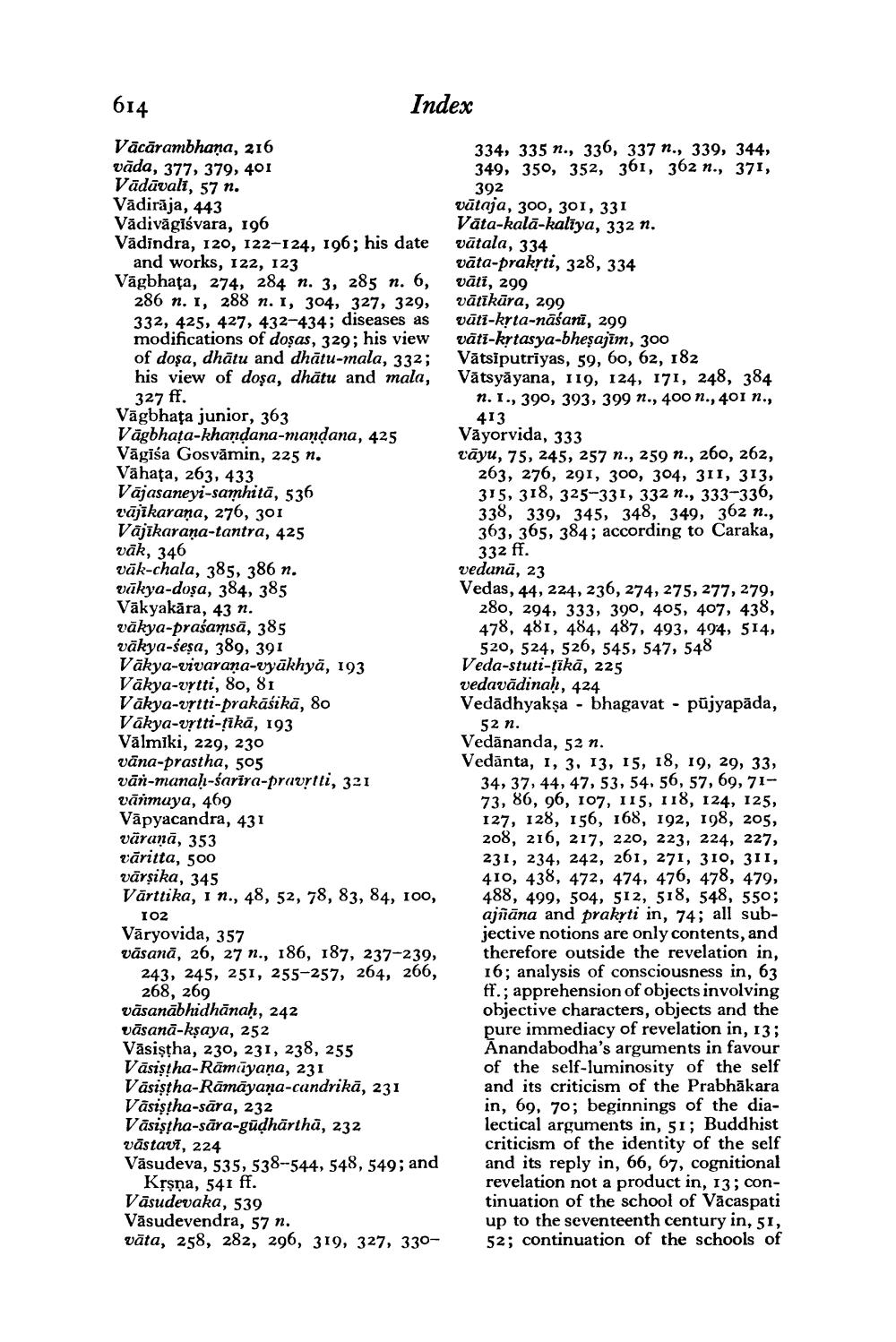________________
614
Vācārambhaṇa, 216 vada, 377, 379, 401 Vadavali, 57 n. Vādirāja, 443 Vădivāgiśvara, 196 Vädindra, 120, 122-124, 196; his date and works, 122, 123 Vägbhata, 274, 284 n. 3, 285 n. 6, 286 n. 1, 288 n. 1, 304, 327, 329, 332, 425, 427, 432-434; diseases as modifications of dosas, 329; his view of doşa, dhātu and dhātu-mala, 332; his view of doșa, dhatu and mala, 327 ff.
Vägbhata junior, 363 Vägbhata-khandana-manḍana, 425 Vāgisa Gosvāmin, 225 n. Vähața, 263, 433 Vajasaneyi-samhita, 536 vajikaraṇa, 276, 301 Vājīkaraṇa-tantra, 425 vāk, 346
väk-chala, 385, 386 n. vakya-dosa, 384, 385 Väkyakāra, 43 n. vākya-praśamsā, 385 vākya-seṣa, 389, 391
Vakya-vivarana-vyākhyā, 193 Vakya-vṛtti, 80, 81 Vakya-vṛtti-prakāśikā, 80 Vakya-vṛtti-tikā, 193
Index
Valmiki, 229, 230 vana-prastha, 505 vān-manaḥ-śarira-pravṛtti, 321
vānmaya, 469 Vapyacandra, 431
vāraṇā, 353
väritta, 500
vārṣika, 345
Vārttika, 1 n., 48, 52, 78, 83, 84, 100,
102
Vāryovida, 357
vāsanā, 26, 27 n., 186, 187, 237-239, 243, 245, 251, 255-257, 264, 266, 268, 269
vāsanābhidhānaḥ, 242 vāsanā-kṣaya, 252
Vasiṣṭha, 230, 231, 238, 255 Vasistha-Rāmāyaṇa, 231 Vasiṣṭha-Rāmāyaṇa-candrikā, 231 Vasistha-sara, 232
Vasistha-sara-gūḍhārthā, 232
vāstavi, 224 Vasudeva, 535, 538-544, 548, 549; and Kṛṣṇa, 541 ff. Vasudevaka, 539 Vasudevendra, 57 n. vāta, 258, 282, 296, 319, 327, 330
334, 335 n., 336, 337 n., 339, 344, 349, 350, 352, 361, 362 n., 371,
392
vātaja, 300, 301, 331 Vata-kala-kaliya, 332 n. vātala, 334 vāta-prakṛti, 328, 334 vāti, 299 vātīkāra, 299 vāti-kṛta-nāśanī, 299
vati-kṛtasya-bheṣajim, 300 Vātsiputriyas, 59, 60, 62, 182 Vātsyāyana, 119, 124, 171, 248, 384
n. I., 390, 393, 399 n., 400 n., 401 n., 413 Vayorvida, 333
tāyu, 75, 245, 257 n., 259 n., 260, 262, 263, 276, 291, 300, 304, 311, 313, 315, 318, 325-331, 332 n., 333-336, 338, 339, 345, 348, 349, 362 n., 363, 365, 384; according to Caraka, 332 ff. vedanā, 23
Vedas, 44, 224, 236, 274, 275, 277, 279, 280, 294, 333, 390, 405, 407, 438, 478, 481, 484, 487, 493, 494, 514, 520, 524, 526, 545, 547, 548 Veda-stuti-tikā, 225 vedavādinaḥ, 424
Vedadhyakṣa bhagavat - pūjyapāda, 52 n. Vedānanda, 52 n.
Vedanta, 1, 3, 13, 15, 18, 19, 29, 33, 34, 37, 44, 47, 53, 54, 56, 57, 69, 7173, 86, 96, 107, 115, 118, 124, 125, 127, 128, 156, 168, 192, 198, 205, 208, 216, 217, 220, 223, 224, 227, 231, 234, 242, 261, 271, 310, 311, 410, 438, 472, 474, 476, 478, 479, 488, 499, 504, 512, 518, 548, 550; ajñāna and prakyti in, 74; all subjective notions are only contents, and therefore outside the revelation in, 16; analysis of consciousness in, 63 ff.; apprehension of objects involving objective characters, objects and the pure immediacy of revelation in, 13; Anandabodha's arguments in favour of the self-luminosity of the self and its criticism of the Prabhakara in, 69, 70; beginnings of the dialectical arguments in, 51; Buddhist criticism of the identity of the self and its reply in, 66, 67, cognitional revelation not a product in, 13; continuation of the school of Vacaspati up to the seventeenth century in, 51, 52; continuation of the schools of




